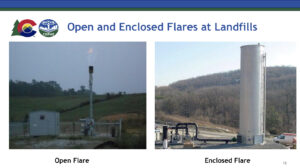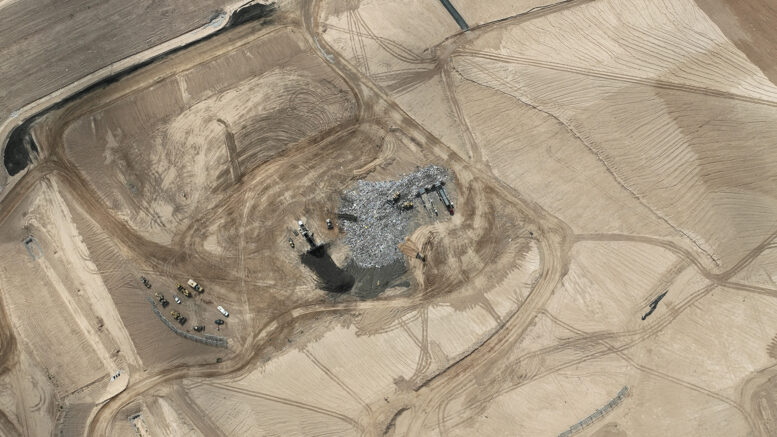Colorado regulators crafting the first methane-emissions reduction mandates for landfills are caught in a crossfire between industry leaders calling their proposal too costly and environmentalists calling it too lax — a dispute that will delay new rules until December.
Over a two-day hearing in August that happened simultaneously with the opening of the special legislative session, the Colorado Air Quality Control Commission heard a flurry of arguments over what is known as Regulation 31. The new rules stem from last year’s Greenhouse Gas Pollution Reduction Roadmap 2.0, which identified landfill methane as an issue that can be addressed in the short term.
Decomposing trash, particularly food waste, makes landfills a top emitter of methane, and the rules proposed by the Colorado Air Quality Control Division seek to require landfill operators to install gas-control systems and more modern covers to deal with that. They do not attempt to increase diversion of materials like food waste from landfills — an initiative that environmental groups have said needs to be addressed in the plan but that would expand state oversight of waste streams in unprecedented ways.
“Hit by a shotgun”
APCD officials began working on the regulations in August 2024 and have made several changes at the behest of waste companies and of local governments operating landfills, who warned that original proposals were not technically or financially feasible. But the changes angered groups like GreenLatinos and Environmental Defense Fund who say they have weakened the proposal to the point where it will do very little over the next five years to reduce emissions, which is a key window in which action must occur.

A Colorado Air Pollution Control Division map shows the locations of public landfills throughout the state.
Thus, at the end of the two-day meeting last month, AQCC members continued the hearing until December, saying they needed the time to look again over the arguments and counterarguments regarding a subject — landfills — with which they’ve never dealt. Commissioner Dan Blankenship said he felt he’d been “hit by a shotgun” with all the material presented by both sides and did not want to rush to make a hasty decision on such a critical matter.
So now, as the governor-appointed regulatory body prepares to debate other subjects in the coming months, including a critical hearing this week to create health-based standards for toxic air contaminants, it also must mull how to dive into regulating a new sector. And the divides between those calling for stricter and looser rules are wide.
Commissioners ponder delaying new rules
Up to now, the U.S. Environment Protection Agency has created landfill regulations and left it to Colorado officials to enforce them. While environmental groups have said those soft rules have endangered the health of communities living near dumps across the state, Beatty & Wozniak energy attorney Chris Colclasure noted that compliance costs caused hundreds of local landfills to close in the 1980s and 1990s and warned that unwieldy new regulations could have a similar impact.
At the heart of its proposal, APCD proposed lowering the threshold on how much trash a landfill must hold to require it to install a gas collection and control system — pipes capturing methane that send the gas to a flaring system or a system converting it to energy. The new rules would cause 18 more landfills to install the pipes, up from the 13 that have them in place now.

A WM frontline operations employee helps oversee the disposal of waste at a landfill.
But with many dump sites being local landfills that have warned they’ll have to raise tipping fees substantially to comply, APCD leaders proposed delaying the requirement to submit GCCS plans for public landfills until 2029, which likely would delay installation until 2031. Environmentalists asked the AQCC to revert to proposals requiring the submissions in 2026, while private landfill operators asked for a similar delay and Western Slope officials said the costs will still be so high that they expect people to turn to illegal dumping instead.
Landfill gas-leak monitoring also an issue
As another concession to concerns about fiscal infeasibility, APCD officials added a provision that new GCCS systems only would be required if the methane concentrations in gas tested at 30% or higher levels. State regulators also extended from 12 months to 18 months the time that landfill operators must submit GCCS plans for approval by the state and extended from one year up to two or three years the amount of time that operators can be laying trash in new plots of land before they must install the systems.
“Over the past several months, the proposed effectiveness of the rules has eroded without significant justification,” said Tim Roth, a Kaplan Kirsch attorney representing EDF. The organization asked the AQCC to reconsider all those concessions.
Meanwhile, operators like WM — the company formerly known as Waste Management whose holdings include six active Colorado landfills and two inactive landfills — and local governments said the rules continue to be too stringent.
The proposal, for example, would require operators to do surface emissions monitoring at intervals of every 25 feet to check for leaks — a major change from EPA rules requiring checks every 98 feet and one that is more restrictive than other states have put forth. SCS Engineers Project Director Bill Haley warned this labor-intensive rule could increase costs sixfold even though a study identified it only increasing emission detections 2.1% per acre.
Strong disagreement over cost estimates

A Colorado Air Pollution Control Division slide shows the difference between open and enclosed flares.
Also, the new rules require landfill operators to phase out open flares that burn off methane and replace them with enclosed flares that backers say are more effective — unless they can prove using open flares as secondary or backup devices is the only feasible option. This provision caused division as well, with environmental groups saying that it creates too easy an out for continued use of open flares and WM asking the state not to require a full feasibility study of companies seeking to use a device as a backup option.
APCD officials estimated the rules will cost landfill operators $209.6 million to implement — predicting a required boost in tipping fees of $3.66 per household annually — but bring $1.11 billion in benefits in the form of reduced health and climate-change-related costs.
Local-government leaders and landfill owners pushed back, saying that the costs are vastly underestimated because they don’t include aspects like the price tag for running new power lines to sites or the increased reporting requirements. And they noted that the permitting delays that plague APCD now will only grow as operators must seek more state approvals, threatening the viability of landfills that must operate on strict new upgrade timelines when state regulators have no timelines to approve or deny projects.
“This is not acceptable, said Clay Taylor, an attorney for the National Waste & Recycling Association who argued that APCD should get 90 days to review GCCS permit applications and that applications should be deemed approved if not rejected in that window. “These systems cost millions of dollars to install. It could be very costly to modify them if the division decides much later that changes are needed.”
What happens next on landfill issue
There are more issues surrounding those proposed rules that AQCC members must debate. Commissioner Martha Rudolph, who chaired the August hearing, noted no less than a dozen of them, including provisions on landfill covers, remote monitoring and thresholds for requiring corrective action, among others.
But it’s clear that commissioners will face pressure not just to approve the proposed rules from APCD but to strengthen or loosen them, as competing interests demand. And while Colorado is not the first state to create landfill-methane regulations stricter than those of the EPA, the AQCC’s decision will send signals about what this state is willing to require that could impact how it seeks to regulate emissions in other sectors as well.
“It’s a very important rule that should get adopted without delay and get adopted in the most stringent way possible,” Tom Bloomfield, another EDF attorney, advised commissioners during the August hearing.
Countered Colclasure, who was representing a coalition of public landfill operators: “This is a complicated area to regulate. It’s difficult to strike the right balance. The division has gone too far in proposing the most restrictive landfill rules in the country.”
The AQCC is scheduled to make its final decision at a meeting that will take place from Dec. 17-19.
